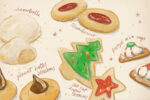There’s something incredibly cozy about the kitchen during the holidays: a steaming pot on the stove, something bubbling and oozing in the oven, all coming together for the most wonderful feast of the season. It’s no doubt that some of the best parts about the holidays are the delicious treats that tag onto festive tidings: the comfort foods that line dinner tables and the sumptuous snacks that are only savored once a year and kick off celebrations all over the world.
The phrase “comfort food” actually appears in the Merriam-Webster Dictionary, and its definition of “food prepared in a traditional style having a usually nostalgic or sentimental appeal” sinks deep into those cozy feelings. With nostalgia attaching itself to both comfort food and holiday joy, the dining table becomes a symbolic hub for all things merry and bright for the season.
While everyone’s holiday tables look different, many factors remain the same. A quick online search yields a slew of possibilities for all parties, from “80 Impressive Christmas Dinner Ideas” to “45 Small Holiday Dinner Ideas.” No matter the size, each list contains every main dish, side dish and dessert imaginable — all that’s left for the host is to pick and choose the “right dish” for the occasion. Having these lists decked out with appetizers for snacking and flavors that satisfy every palate, it’s never been easier to bring together an elaborate table of indulgent eats. However, it is this factor — the fact that tables are so full of indulgences — that creates tension around holiday eating.
So, what does “overindulgence” mean anyways? The complicated synonym for leaning into “too much of a good thing” rings loud alongside seasonal cheer. In short, overindulgence during the holiday season hints at the way that most people enjoy foods that are more “restricted” at other parts of the year.
All the sweets, salty snacks or “off-limits” foods that incite one to control their consumption habits are considered “indulgences,” only to be savored on special/holiday occasions. Trouble arises from these restrictions when it comes to finally enjoying these “off-limits” treats in public: Seasonal snacking is heavily stigmatized as a negative act to avoid during the holidays.
When people are finally able to indulge in their restricted foods during the holidays, the common concerns relate to how snacking will affect one’s physical look. As one blog — coincidentally titled “have a plant” — wrote, “We all want to be able to enjoy the holidays and still fit into our favorite jeans by New Year’s!” Highlighting meal swaps from low-fat meats to hefty amounts of fruits and vegetables, the site helps the reader make a “healthier” holiday plate without regret. If this is how we are framing the season — being hyper-aware of how much we are indulging in food favorites — then what does that say about our relationships with the snacks that we treat ourselves to?
Certain people advocate a portion-based mindset, such as using a small plate because “The less room you have, the less you can put on your plate.” Promoting these kinds of restrictions, especially during the holidays, distracts the individual from the celebratory cheer that should accompany the season.
By focusing on the aftermath of a lush meal, the perspective on the dinner table moves from pleasure to fear. For example, being afraid of not meeting post-holiday weight expectations leads people to believe that they must “prevent” the bad outcomes before they start. This includes, but is certainly not limited to, making some healthy food swaps. The potential anxieties of consuming “too much” of one’s favorite foods result in a plethora of columns like “Healthy Christmas Holiday Recipes” and modifications galore.
However, all this digital content about the “healthy” holiday table forgets to ask the question of if the discussion on seasonal snacking is relevant to the masses. In a world consumed by other types of stress around the holidays — traveling home, finding the perfect gift, etc. — why should one drag on about the modified pies or cakes that line the table spread?
Even though critiquing someone’s choices can come across as bias-ridden, the conversations around holiday snacking expose a kind of stigma that society has against eating and enjoying favorite treats. Since there is a heavy social emphasis — and backlash — on consuming “guilty pleasures” for fun, the sources that spark these debates are just as much to blame as the communities that reinforce these ideas.
One site that detailed “Steps to Get You Back on Track After Holiday Indulgence” situated an ironic point in the middle of its preaching: When talking about getting “healthy” after holiday overindulgence, the article suggested, “Don’t let yourself get bogged down in negative thoughts and emotions.”
Funnily enough, the concept of getting “bogged down” in the negativity of self-image may be caused by this need to immediately reshape and revert back to our “normal” bodies after the festive season. Instead of centering one’s mindset on getting “back” to what once was before the holidays, why does one’s body image even get roped into the conversation anyway?
The season of giving is, after all, a time that should be spent on uplifting others and their accomplishments, not worrying about what is on your plate. Everyone wants to put their kindest faces forward to make their families and friends smile, but those presentations should not have anything to do with seasonal snacking habits.
The reality of self-image and body image being equated to food consumption is so pervasive today that even the holidays are touched by this snacking stigma. How much we eat and what type of food, when to eat and to what extent: All these questions are, unfortunately, occupying an individual’s subconscious during the holiday season. These underlying thoughts of snacking stigma are equally real and unproductive, no matter how true or false they are to the individual. On a very basic level, it is extra difficult to enjoy the moment if all someone is thinking about is how much a piece of cake is going to impact their diet.
Regardless of the ways that holiday snacking is stigmatized as “overindulgence,” what one eats is strictly their own choice. Whether a person chooses a healthier version of a timeless classic or not will only be a result of how they value that dish on their dinner table. In a present where the health and safety of all is a priority, there’s nothing wrong with making a few health-conscious choices. Everything from meal planning, drinking more water and enjoying favorite foods in moderation are completely balanced ways of viewing food consumption, even for the holidays.
Additionally, another reason for rethinking seasonal favorites is to just add more nutrition to extravagant celebrations. Even if these are not the reasons that one has for choosing a healthier version of annual cravings, having respect for how these choices are made matters more than what ends up on the table.
Holiday food culture is a stark reminder that every family chooses to celebrate different holidays, in the same way that they choose different dishes to feature in their traditions. Since food can have such deep cultural or religious connections, the symbolic meaning of the holiday meal is hard to separate from that label of “tradition.” When the concept of reinterpreting those uber-traditional rituals in a “healthier” light is thrown in the mix, the nature of the holiday can change.
On one hand, the ability to be more health-conscious during a time of luxurious snacking and indulgence is not such a bad thing to practice. However, modifying long-standing traditions can also be seen as a potential “competitor” to the holiday norm. For example, after years and years of preparing a dish one way, suddenly making a change to the recipe can come across as a subtle “culture shock” to family traditions. Exchanging the old for the new can be interpreted as wanting to leave those “old ways” in the past, to the dismay of some.
In a quote from Marin Magazine, the author stated, “Comfort foods, by their very nature, appeal to us for their ability to satisfy an emotional hunger.” While making those kinds of healthy-over-indulgent swaps is a breeze, one must be mindful of the personal connection to the meal that might be compromised in the process. Knowing that food can evoke such an emotional reaction from a person may stand as a reason to not change a more “traditional” recipe.
The tricky part of this entire ordeal is the fact that snacking swaps are not intentionally malicious; most of the time, people just want to modify their favorite foods for the sake of their health or other dietary requirements. But the moment when a family member shows up to the holiday party with a veggie-heavy version of grandma’s signature stuffing, heads will definitely turn.
Holiday indulgences and the modifications made to enjoy them are both valid approaches to crafting crowd-pleasing table spreads. By acknowledging that there are two sides to the conversation of festive food traditions, it reminds everyone that at the end of the day, the holiday table is personal and customizable.
From the decor to the people involved, and especially the delicious goods that occupy every square inch of the table, the holiday food experience is something that can and should be tailored to the guests’ tastes. As long as you and your loved ones are embracing those shared moments together, the “healthy” factor of the meal is just a complement to a fantastic occasion. So grab a napkin, pull up a chair and enjoy any of the festive flavors that your heart desires.

















